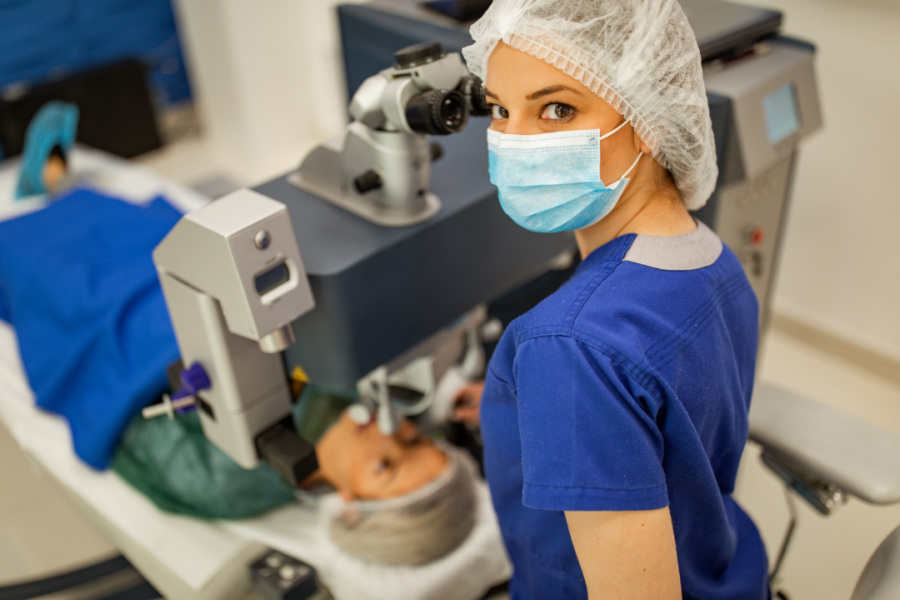LASIK surgery is a popular and effective vision correction procedure that can significantly enhance one’s quality of life. However, to ensure the best possible outcome and minimize the risk of complications, post-operative care is crucial. In this article, we will explore the essentials of post-LASIK care, including what to do and what to avoid for optimal healing and long-term eye health.
Understanding LASIK Surgery
Before we delve into post-LASIK care, let’s first familiarize ourselves with the basics of LASIK surgery. LASIK, which stands for Laser-Assisted In Situ Keratomileusis, is a refractive procedure that reshapes the cornea using a laser to correct vision problems such as nearsightedness, farsightedness, and astigmatism. By altering the cornea’s shape, LASIK enables light to properly focus on the retina, resulting in improved vision.
The Basics of LASIK

LASIK surgery involves two main steps: creating a protective corneal flap and using a laser to reshape the cornea. During the procedure, your eye surgeon will use a microkeratome or femtosecond laser to create a thin flap in your cornea. This flap is then lifted, and the underlying corneal tissue is gently reshaped using an excimer laser. Once the cornea is reshaped, the flap is repositioned, acting as a natural bandage for the healing process.
It is important to note that LASIK surgery is a highly precise and individualized procedure. Your eye surgeon will carefully evaluate your eyes and determine the most suitable treatment plan for you. The entire process is typically completed within minutes, and most patients experience minimal discomfort during the surgery.
After the procedure, you may experience some temporary side effects, such as dry eyes, sensitivity to light, and mild discomfort. These symptoms are normal and usually subside within a few days or weeks. Your eye surgeon will provide you with detailed instructions on how to manage these side effects and ensure a smooth recovery. You can read more about The Science Behind LASIK: How Precise Lasers Improve Vision by visiting here.
Why Post-Operative Care is Crucial
Post-operative care plays a vital role in the success and safety of your LASIK surgery. Following your surgeon’s instructions precisely will help prevent complications and ensure a smooth recovery. Keep in mind that every individual’s healing process may vary slightly, so it is crucial to consult with your eye care professional for personalized guidance.
During the initial days after LASIK surgery, it is essential to avoid any activities that may strain your eyes, such as reading for long periods or using electronic devices excessively. Your eye surgeon may also recommend using lubricating eye drops to keep your eyes moist and alleviate any dryness or discomfort.
It is common to experience some fluctuations in your vision during the first few weeks after LASIK surgery. This is a normal part of the healing process as your eyes adjust to the new corneal shape. It is important to attend all follow-up appointments with your eye surgeon to monitor your progress and ensure that your vision is stabilizing as expected.
Additionally, it is crucial to protect your eyes from any potential injury or infection during the healing period. Your eye surgeon may advise you to avoid swimming, hot tubs, and strenuous physical activities that may increase the risk of eye trauma. Wearing protective eyewear, such as sunglasses, when outdoors can also help shield your eyes from harmful UV rays and debris.
Following a healthy lifestyle and maintaining good overall eye hygiene is also important for a successful LASIK surgery outcome. Eating a balanced diet rich in vitamins and minerals, getting regular exercise, and avoiding smoking can promote optimal healing and reduce the risk of complications.
In conclusion, LASIK surgery is a highly effective procedure that can correct various vision problems. By understanding the basics of LASIK and following proper post-operative care, you can maximize the benefits of the surgery and enjoy improved vision for years to come.
Immediate Aftercare Post-LASIK
After undergoing LASIK surgery, it is natural to have questions about the immediate aftercare process. Let’s explore what to expect during the first 24 hours and the following week.
The First 24 Hours
During the initial 24 hours after LASIK, your eyes may feel irritated, and you may experience dryness, light sensitivity, and mild discomfort. It is important to avoid rubbing your eyes to prevent any damage to the healing cornea. Applying the prescribed eye drops at regular intervals will help minimize dryness and promote healing. It is advisable to rest and avoid strenuous activities during this period.
Additionally, it is crucial to follow the post-operative instructions provided by your surgeon. These instructions may include wearing protective goggles or shields while sleeping to prevent accidental rubbing of the eyes. You may also be advised to avoid wearing eye makeup or using any skincare products near the eyes for a certain period.
Furthermore, it is common to experience some blurry vision immediately after the surgery. This blurriness is temporary and should improve as the healing process progresses. However, if you notice any sudden or severe changes in your vision, it is important to contact your eye doctor immediately.
The First Week
As the days progress, you will notice an improvement in your vision. However, it is essential to remember that your eyes are still in the healing phase. It is normal to experience fluctuations in vision, dryness, and light sensitivity during the first week after LASIK. Be diligent in using prescribed eye drops, and avoid excessive screen time and exposure to dusty or smoky environments. It is also crucial to protect your eyes from direct sunlight by wearing sunglasses when outdoors.
During the first week, you may have scheduled follow-up appointments with your surgeon to monitor your progress. These appointments are important to ensure that your eyes are healing properly and to address any concerns or questions you may have. Your surgeon may perform various tests to assess your visual acuity and the overall health of your eyes.
It is worth noting that everyone’s healing process is unique, and some individuals may experience a faster or slower recovery than others. It is important to be patient and allow your eyes the time they need to heal fully. Avoid strenuous activities, swimming, and contact sports until your surgeon gives you the green light to resume these activities.
During the first week, it is also important to maintain good hygiene to prevent any infections. Wash your hands thoroughly before applying eye drops or touching your eyes. Avoid using any products that may irritate your eyes, such as perfumes, lotions, or harsh chemicals.
Remember, the first week after LASIK is a critical time for your eyes to heal and adjust. By following the post-operative instructions provided by your surgeon, using prescribed eye drops, and taking necessary precautions, you can help ensure a smooth and successful recovery.
Long-Term Care After LASIK
While the immediate recovery period is critical, long-term care is equally important to maintain the best possible vision and ensure the health of your eyes.
After LASIK surgery, it is crucial to understand that your eyes will require ongoing care and attention. This will help you maintain optimal eye health and enjoy the benefits of clear vision for years to come.
Eye Health Maintenance
To maintain optimal eye health after LASIK, it is essential to adopt healthy habits. Ensure you consume a balanced diet rich in vitamins and minerals that support eye health, such as leafy greens, citrus fruits, and fatty fish. These foods contain nutrients like vitamin C, vitamin E, zinc, and omega-3 fatty acids, which are known to promote eye health and reduce the risk of age-related eye diseases.
In addition to a healthy diet, protecting your eyes from harmful UV rays is crucial. Ultraviolet (UV) radiation from the sun can damage your eyes and increase the risk of developing conditions like cataracts and macular degeneration. Therefore, it is important to wear sunglasses with adequate UV protection whenever you are outdoors, especially during peak sunlight hours.
Furthermore, avoiding smoking is essential for maintaining good eye health. Smoking has been linked to an increased risk of various eye conditions, including cataracts, macular degeneration, and optic nerve damage. By quitting smoking or avoiding exposure to secondhand smoke, you can significantly reduce the risk of developing these vision-threatening conditions.
Lastly, maintaining overall physical health is crucial for your eye health. Conditions like diabetes and high blood pressure can affect the blood vessels in your eyes and lead to vision problems. By managing these conditions through regular exercise, a balanced diet, and medication if necessary, you can help protect your eyes and maintain good vision.
Regular Check-ups and Follow-ups
Regular check-ups with your eye care professional are crucial to monitor your post-LASIK progress and address any concerns. These check-ups allow your surgeon to assess your vision, check the stability of your refraction, and identify any potential issues that may require intervention.
During these follow-up visits, your eye care professional will evaluate the healing process of your eyes and ensure that your vision is stable and free from complications. They may perform various tests, such as measuring your visual acuity, examining the cornea, and assessing the overall health of your eyes.
By adhering to these recommended visits, you can help ensure the long-term success of your LASIK surgery. Your eye care professional will be able to detect any changes or issues early on, allowing for prompt intervention and appropriate treatment, if necessary.
Remember, LASIK surgery is a life-changing procedure that can significantly improve your vision. However, it is essential to prioritize long-term care and follow the guidance of your eye care professional to maintain the best possible outcomes and enjoy clear vision for years to come.
Do’s and Don’ts After LASIK Surgery
Following LASIK surgery, there are certain activities you should avoid and recommended practices to aid the healing process.
Activities to Avoid
During the initial healing period, it is important to avoid activities that may pose a risk to your eyes. These activities include swimming, strenuous exercise, and any contact sports. Additionally, refrain from using eye makeup for a few days and avoid exposing your eyes to excessive dust or smoke.
Recommended Practices
To promote optimal healing, it is crucial to follow your surgeon’s instructions diligently. Use the prescribed eye drops as directed, even if you feel your eyes have healed. Avoid rubbing your eyes and wear protective eyewear, such as goggles, when engaging in activities that may cause debris or dust to enter your eyes.
Potential Complications and How to Handle Them
While LASIK is generally safe and effective, complications can arise in rare cases. By being aware of common side effects and knowing when to seek medical attention, you can navigate any potential concerns with confidence.
Common Side Effects
Following LASIK surgery, it is normal to experience temporary side effects. These may include dry eyes, glare, halos, fluctuating vision, and mild discomfort. These side effects typically improve over time as your eyes heal. However, if they persist or worsen significantly, it is essential to consult your eye care professional.
When to Seek Medical Attention
In rare cases, complications may occur after LASIK surgery. If you experience severe pain, sudden vision changes, severe sensitivity to light, or any signs of infection, contact your eye care professional immediately. Prompt attention can help prevent any potential issues from progressing and ensure your eyes remain healthy.In conclusion, post-LASIK care plays a crucial role in the success of your vision correction surgery. By understanding and following the recommended practices, avoiding risky activities, and seeking medical attention when necessary, you can enhance your healing process and maintain the benefits of LASIK for years to come. Remember, your eye care professional is your trusted resource throughout your post-operative journey, so be sure to consult them for personalized advice and guidance.


